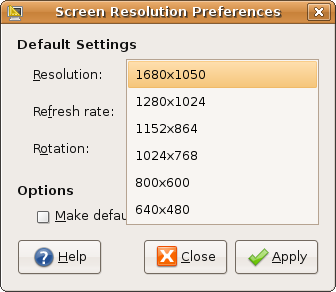Ubuntu 7.10 should make Dell happy

I have just upgraded my new Dell computer that came with Ubuntu 7.04 to the pre-release version of Ubuntu 7.10 (Beta). Please read my initial review of this system . After a large download and subsequent reboot, this computer came up in much better shape than it was in 7.04. Most notably, it detected the correct resolution and came up in 1680x1050. I also had many more resolutions to choose from. Instead of the three resolutions I had before, I now have six choices. Secondly, the Ubuntu Restricted Driver Manager correctly detected my NVIDIA video card and prompted me to enable the driver for it. Once I told Ubuntu to enable the NVIDA driver, it downloaded the driver and requested that I reboot my computer. After the reboot, I was saddened to see that it came up again in 1024x768. I opened the screen resolution tool and found that my optimal resolution was no longer a choice. In fact, while I still had six resolutions to choose from, 1024x768 was the highest one. Any ideas why th

